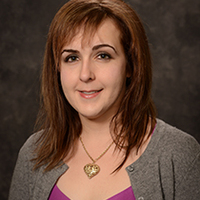Elevate your understanding of polymers
Advance your career and develop your expertise in polymers with UW–Madison’s capstone certificate in Polymer Processing and Manufacturing.
Earn a respected credential from a top engineering school and expand your technical knowledge in the polymer industry.
How can this capstone certificate help me?
The University of Wisconsin–Madison’s capstone certificate in Polymer Processing and Manufacturing prepares engineers for professional practice in the polymer industry.
Designed for working professionals, the 100% online graduate-level certificate develops your understanding and skills related to the fabrication of polymers. You’ll learn how to explain common synthetic strategies for fabrication and analyze outcomes of the materials. You’ll also learn how to evaluate issues within the manufacturing and processing of a material or compound.
U.S. News & World Report consistently ranks UW–Madison’s online engineering programs among the top. This polymer certificate program is based on our polymer master’s program, which is internationally recognized for research and teaching in polymer engineering and science.
As a UW–Madison engineering student, you also have access to our Polymer Engineering Center, a university-industry-government collaborative that creates, integrates, and applies knowledge of polymer engineering and processing.
MEPE Minute Polymer Blog
MEPE Minute: Congratulations Graduate
Happy summer everyone! I just wanted to take a minute as our summer classes start to congratulate our MEPE grad from spring 2024, Jeremy Williams! Jeremy works for Eastman in Tennessee and entered the program …
MEPE Minute: MEPE Instructor Honored by Adhesives and Sealants Council
Kristoffer Stokes, an instructor for our Polymer Engineering master’s degree, was recently honored by the Adhesives and Sealants Council. His company, Geisys Ventures, in collaboration with the Costanzo lab at Cal Poly, received an award …
- See More Stories
9 credits
2-3 semesters
$1300 per credit
Resident and non-resident
Aug 15/Jan 15/June 1
Fall/spring/summer application deadlines
Nicole S. Zacharia, PhD
Academic Director
Karene Cary, MS
Graduate Program Advisor
- Course and Degree Plan
- Learning Online
- Faculty & Staff
- Admission Requirements
- Tuition and Financial Aid
Academics
Designed for working professionals, this capstone certificate program will benefit engineers looking to advance in the field of polymer engineering and science.
The distance-learning design of this program allows you to learn off campus at times convenient to your full-time work schedule and allows you to plan around other family and work obligations. Topics may include issues or problems related to your work interests or career goals.
Curriculum
The course curriculum is designed by leaders in the field of polymer engineering and science.
Throughout your studies, you will focus on building a solid understanding of fundamental polymer processing, the analysis of composite materials and methodologies related to computational fluid dynamics.
For more information on program degree requirements, please contact Academic Director Dr. Nicole Zacharia.
Choose any three of the classes below:
-
- EPD 640 Introductory Polymer Rheology
- EPD 650 Introduction to Polymers Processing
- ME 419 Fundamentals of Injection Molding
- ME 514 Intro to Additive Manufacturing
- ME 717 Advanced Polymer Processing
- EPD 639 Plastics Recycling and Sustainability
- ME 718 Modeling and Simulation in Polymer Processing
- ME 417 Transport Phenomena in Polymer Processing
- ME 418 Engineering Design with Polymers
At UW-Madison, we’ve built a learning experience to meet you where you are.
Whether your work involves frequent travel, changing hours, or periods of intense demand, our courses help you grow wherever you happen to be and whenever you have online access. We develop and deliver courses for high-performing professionals, with a deep understanding of the challenges those professionals face.
As a UW student, you will be part of a vibrant community, challenged and supported by your fellow learners, as well as instructors. Our students and alumni consistently point to the value of the global professional network they develop through our programs, built through teamwork, challenges, and projects, and lasting a lifetime.
Faculty members in the polymer engineering curriculum are experts in their field and offer students an engaging educational experience that is convenient, accessible, and engaging, no matter where they are located.
- Academic Director: Nicole S. Zacharia, PhD
- Graduate Programs Administrator: Justin Kyle Bush, MED
- Graduate Academic Advisor: Karene Cary, MS
- Faculty Director: Tim Osswald, PhD
- Robert E. Rowlands, PhD
- Kristoffer Stokes, PhD
- Lih-Sheng Turng, PhD
- Bob Weiss, PhD
- Don Baird, PhD
Admission Requirements
Admission requirements for the Polymer Processing and Manufacturing Capstone Certificate program are listed below.
Exceptions to standard admission requirements are considered by the admissions committee on an individual basis.
- A bachelor of science (BS) degree from a program accredited by the Accreditation Board for Engineering and Technology (ABET) or the equivalent.*
- A minimum undergraduate grade-point average (GPA) of 2.75 or the equivalent of the last 60 semester hours (approximately two years of work) or a master’s degree with a minimum cumulative GPA of 2.75. Applicants from an international institution must have a strong academic performance comparable to a 2.75 for an undergraduate or master’s degree. All GPAs are based on a 4.00 scale. We use your institution’s grading scale; do not convert your grades to a 4.00 scale.
- Applicants whose native language is not English must provide scores from the Test of English as a Foreign Language (TOEFL). The minimum acceptable score on the TOEFL is 580 on the written version, 243 on the computer version, or 92 on the Internet version.
- International applicants must have a degree comparable to an approved U.S. bachelor’s degree.
- Applicants may submit scores from the Graduate Record Examination (GRE), but are not required to.
*Equivalency to an ABET accredited program: Applicants who do not hold a bachelor’s degree from an ABET accredited program may also qualify for admission to the program. Such applicants must have a BS in science, technology, or a related field with sufficient coursework and professional experience to demonstrate proficiency in engineering practice OR at least 16 credits of math and science coursework. Registration as a professional engineer by examination, if achieved, should be documented to support your application.
All applicants are advised to determine whether this program meets requirements for licensure in the state where they live. See the National Society of Professional Engineers website for contact information for state licensing boards
Tuition Costs
$1,300 per credit, payable at the beginning of each semester.
Tuition includes:
- Technology costs for online course delivery
- Library use
- Advising
- Technical support
- Access to campus computing resources
Total Tuition
Total tuition for this program is $11,700*.
*This total does not include textbooks or course software. Software required for courses is typically available in educational versions at substantial discounts.
Federal Loans
Students who are U.S. citizens or permanent residents are eligible to receive some level of funding through the Federal Direct loan program. These loans are available to qualified graduate students who are taking at least four credits during the fall and spring semesters, and two credits during summer. Private loans are also available. Learn more about financial aid.
Employer Support
Many students receive some financial support from their employers. Often, students find it beneficial to sit down with their employer and discuss how this program applies to their current and future responsibilities. Other key points to discuss include how participation will not interrupt your work schedule.
News
How to Apply – Polymer Science
Please read these steps carefully before submitting your application online: Apply1. Complete the University of Wisconsin–Madison Graduate School online application. In the application be sure to: Upload a PDF version of your current resume/CV Upload …
4 Problems That Engineering Data Analysts Solve
https://online.uottawa.ca/blog/ways-engineers-use-data-analytics If you’re interested in becoming an engineering data analyst, you might already be aware that they occupy dynamic roles in a variety of industries, from e-commerce and finance to healthcare and manufacturing. But are …
What Is the Online Classroom Like at UW?
When contemplating the pursuit of an online degree, a common concern arises: What will the online classroom experience be like? If you’ve had any less-than-stellar experiences with online learning in the past, rest assured that …
- More news


